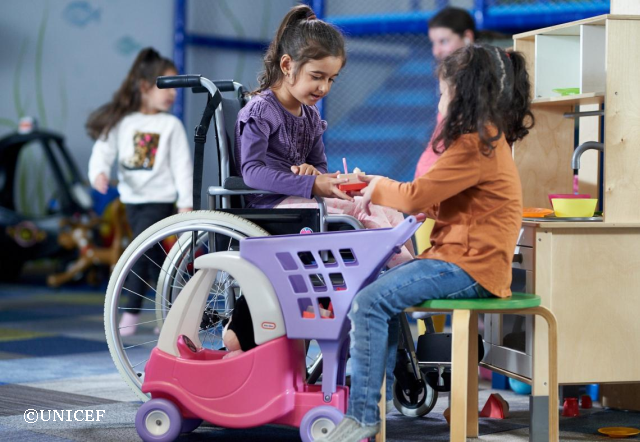Campaign for Integrating Disabled Children
'The place of disabled children is next to all other children, in the community, school, and family'

România Internațional, 05.02.2020, 14:25
The place of disabled children is next to all other children, in the community, school, and family. This is the message of an awareness raising campaign called We grow stronger together, launched in Bucharest by the Ministry of Labor and Social Protection, through its National Authority for the Rights of the Disabled, Children, and Adoptions. The other partners are the Ministry of Education and UNICEF. Romania has around 70,000 disabled children officially, of which about half are isolated in special needs schools, while the others, who go to regular schools, dont get the benefit of special help. Even if Romania is signatory to the UN convention on the rights of the disabled, committing to moving from special needs schools to inclusive ones, things are slow in moving forward, according to the UNICEF representative to Romania Gabriel Vockel. Parents of children with special needs spend thousands of Euro every year for treatment, while children whose parents cannot afford that remain isolated in homes or institutions, according to Madalina Turza with the National Authority for the Rights the Disabled, Children, and Adoptions:
“Unfortunately, right now in Romania we have only about 270 services of daycare or recovery therapy, which means that nationally we have only a limited number of services, which provide only minimal coverage, and barely that, for less than 18% of disabled children in Romania. And that is why things are so complex and difficult in terms of providing for inclusion. Also, we are still at the point at which about 36% of children under special protection are in this situation because of poverty, and 8% because of disabilities. Which means that, absent sufficient and effective leverage for these children, they end up being institutionalized.”
The lack of state involvement in supporting children with disabilities results in abandonment, according to Madalina Turza:
“One of the priorities that I and the Authority have is to regulate the so-called take a break services for disabled children, because in Romania families of these children carry a terribly heavy burden, they have no place to leave their children for a few hours, or for a day or two, in order to handle what problems they may have. That is why parents get overwhelmed and the risk of abandonment rises from then on. We have created mobile teams in all counties for early services for disable children, services of integration into the community, and we have plans to further finance these services. This is a crucial aspect in the inclusion of children with disabilities. We need well trained specialists to work with various types of therapy, of intervention, of recovery, all the services that disabled children need.”
There are thousands of cases in Romania of children who suffer discrimination or exclusion, because not all teachers are trained in working with them. There are counties in Romania that have only one trained teacher for every 150 disabled children. Minister of Education and Research Monica Anisie promised that the number of guidance councilors in schools will soon grow:
“I plan on increasing the number of guidance councilors in pre-university education system, and in teacher training. I held discussions with representatives of universities in order to have a higher number of guidance councilors in the 2020 school year, because society needs help in this area. We plan on working together to train school staff in the competencies of working with disabled children. We encourage parents to join us, we encourage teaching staff to support the children and to have aspiring teachers specialize by continuous training or by initial training.”
Discrimination against special needs children happens all over Europe, not just Romania. UNICEF data shows that at least 75% of the 5.1 million disabled children living in CEE and Central Asia are denied quality education. Also according to UNICEF, there are over 93 million disabled children.






























